Early Childhood Education Diploma: Developing a Training Plan
VerifiedAdded on 2023/06/13
|12
|2369
|462
Report
AI Summary
This report details the development and implementation of a training program for early childhood educators, focusing on enhancing cognitive development practices. A survey was conducted to identify the training needs of educators, revealing a desire for more cognitive development strategies in their teaching. The training plan includes power point presentations, feedback sessions, and monthly examinations to monitor progress. The plan was implemented, and feedback was gathered to evaluate its effectiveness, leading to modifications such as incorporating written fact sheets, on-the-job monitoring, and dynamic leadership approaches. The importance of documentation and data protection throughout the training process is emphasized, ensuring the program's success and continuous improvement. Desklib provides a platform to explore similar solved assignments and past papers for students.
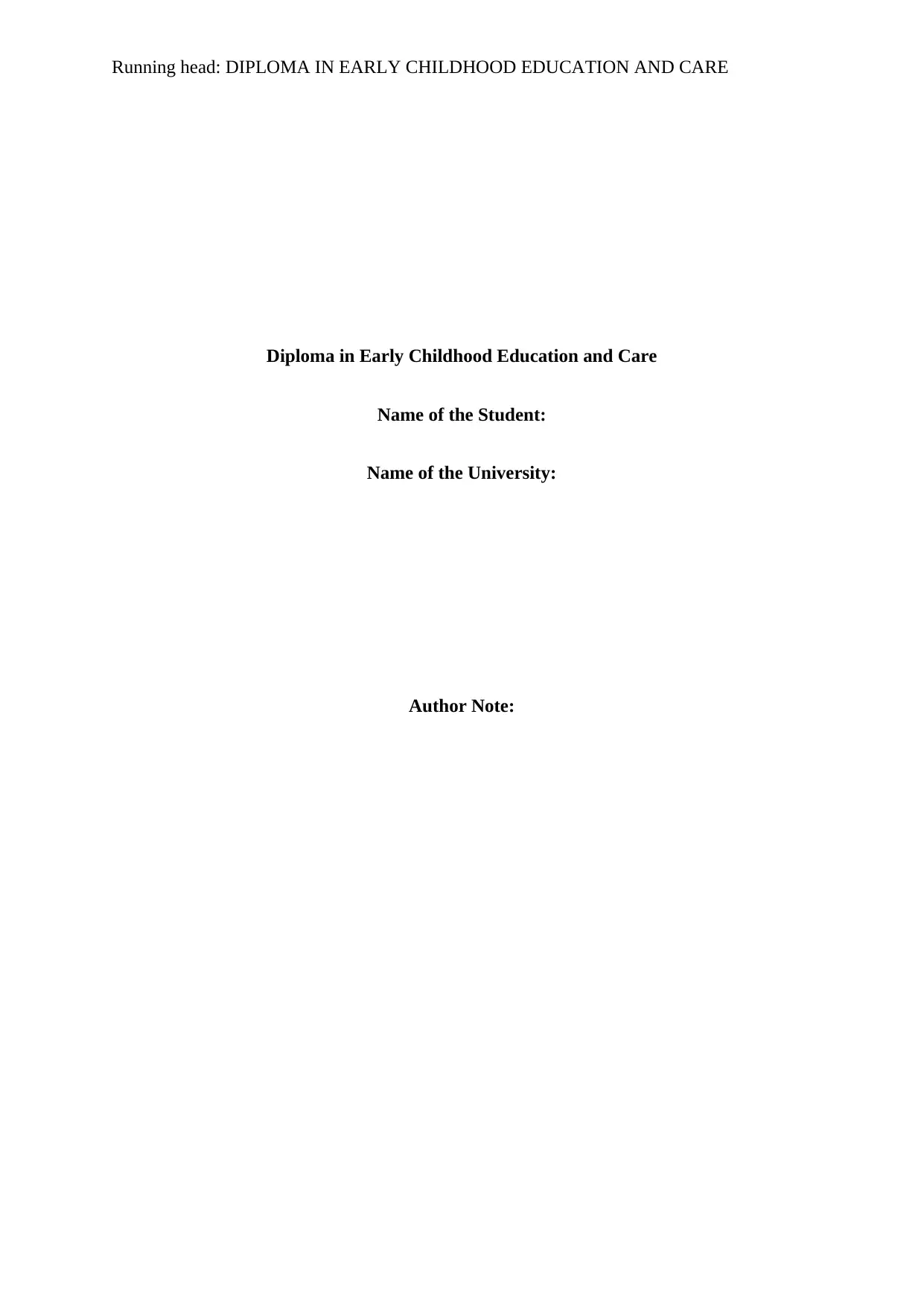
Running head: DIPLOMA IN EARLY CHILDHOOD EDUCATION AND CARE
Diploma in Early Childhood Education and Care
Name of the Student:
Name of the University:
Author Note:
Diploma in Early Childhood Education and Care
Name of the Student:
Name of the University:
Author Note:
Paraphrase This Document
Need a fresh take? Get an instant paraphrase of this document with our AI Paraphraser
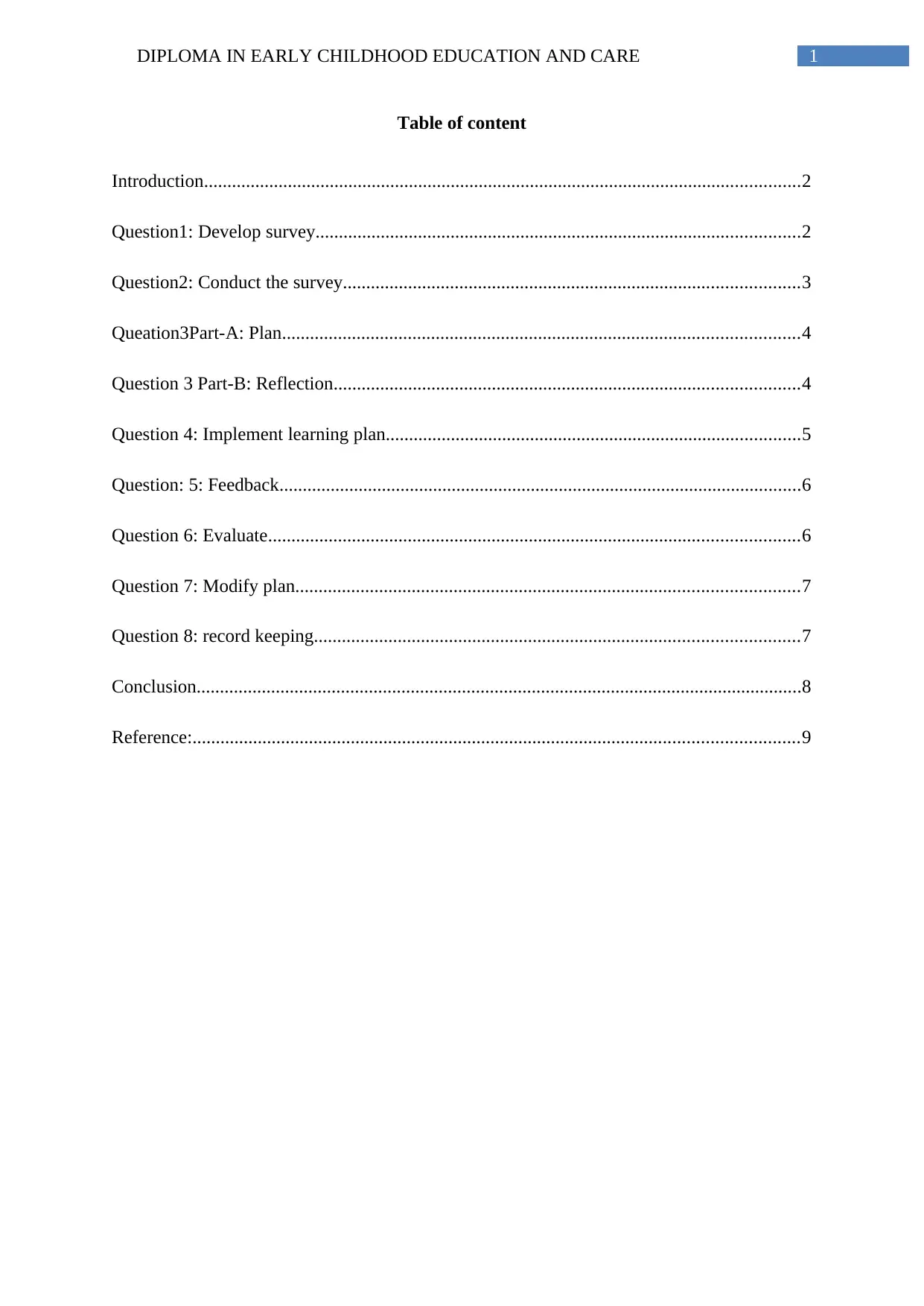
1DIPLOMA IN EARLY CHILDHOOD EDUCATION AND CARE
Table of content
Introduction................................................................................................................................2
Question1: Develop survey........................................................................................................2
Question2: Conduct the survey..................................................................................................3
Queation3Part-A: Plan...............................................................................................................4
Question 3 Part-B: Reflection....................................................................................................4
Question 4: Implement learning plan.........................................................................................5
Question: 5: Feedback................................................................................................................6
Question 6: Evaluate..................................................................................................................6
Question 7: Modify plan............................................................................................................7
Question 8: record keeping........................................................................................................7
Conclusion..................................................................................................................................8
Reference:..................................................................................................................................9
Table of content
Introduction................................................................................................................................2
Question1: Develop survey........................................................................................................2
Question2: Conduct the survey..................................................................................................3
Queation3Part-A: Plan...............................................................................................................4
Question 3 Part-B: Reflection....................................................................................................4
Question 4: Implement learning plan.........................................................................................5
Question: 5: Feedback................................................................................................................6
Question 6: Evaluate..................................................................................................................6
Question 7: Modify plan............................................................................................................7
Question 8: record keeping........................................................................................................7
Conclusion..................................................................................................................................8
Reference:..................................................................................................................................9
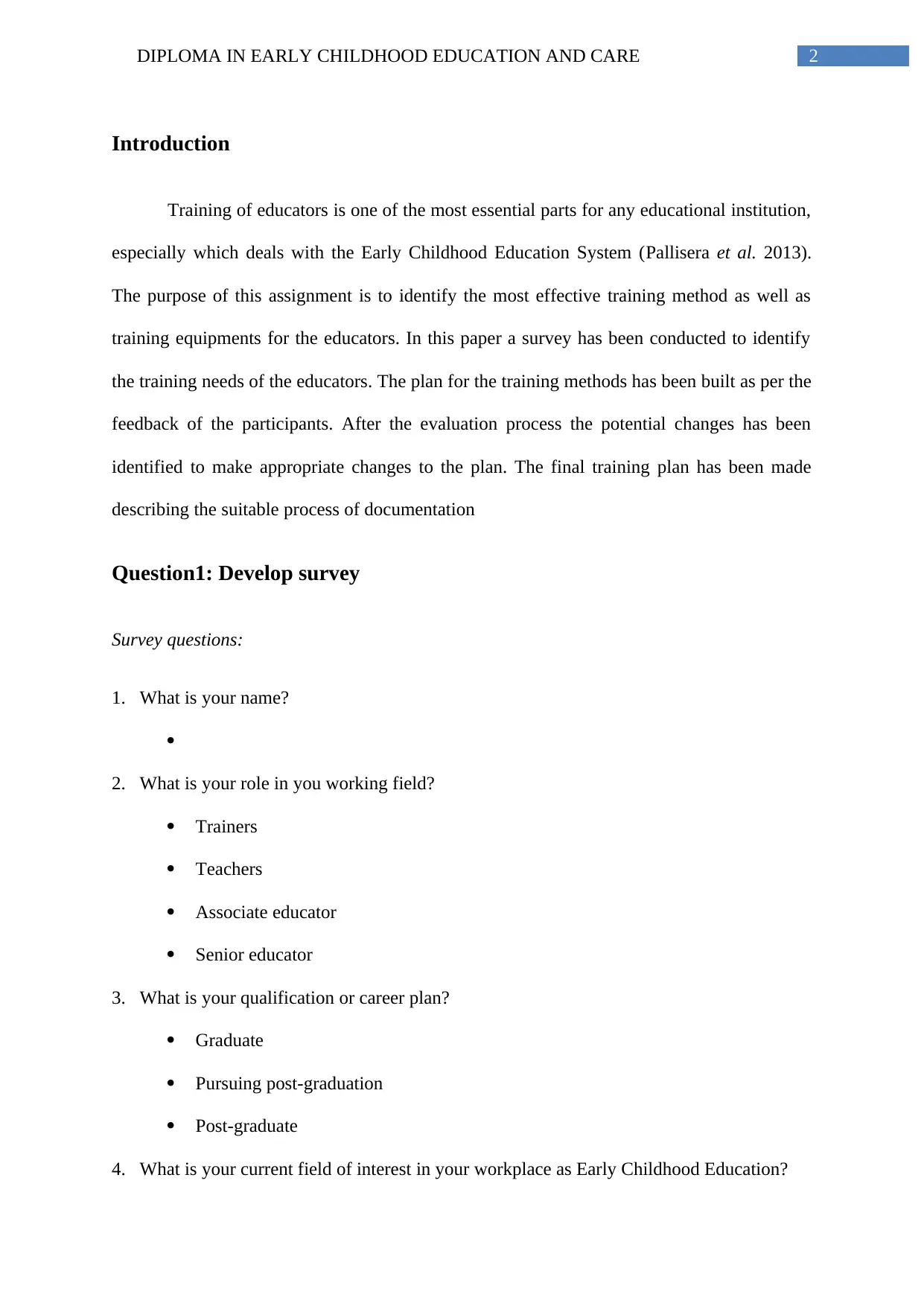
2DIPLOMA IN EARLY CHILDHOOD EDUCATION AND CARE
Introduction
Training of educators is one of the most essential parts for any educational institution,
especially which deals with the Early Childhood Education System (Pallisera et al. 2013).
The purpose of this assignment is to identify the most effective training method as well as
training equipments for the educators. In this paper a survey has been conducted to identify
the training needs of the educators. The plan for the training methods has been built as per the
feedback of the participants. After the evaluation process the potential changes has been
identified to make appropriate changes to the plan. The final training plan has been made
describing the suitable process of documentation
Question1: Develop survey
Survey questions:
1. What is your name?
2. What is your role in you working field?
Trainers
Teachers
Associate educator
Senior educator
3. What is your qualification or career plan?
Graduate
Pursuing post-graduation
Post-graduate
4. What is your current field of interest in your workplace as Early Childhood Education?
Introduction
Training of educators is one of the most essential parts for any educational institution,
especially which deals with the Early Childhood Education System (Pallisera et al. 2013).
The purpose of this assignment is to identify the most effective training method as well as
training equipments for the educators. In this paper a survey has been conducted to identify
the training needs of the educators. The plan for the training methods has been built as per the
feedback of the participants. After the evaluation process the potential changes has been
identified to make appropriate changes to the plan. The final training plan has been made
describing the suitable process of documentation
Question1: Develop survey
Survey questions:
1. What is your name?
2. What is your role in you working field?
Trainers
Teachers
Associate educator
Senior educator
3. What is your qualification or career plan?
Graduate
Pursuing post-graduation
Post-graduate
4. What is your current field of interest in your workplace as Early Childhood Education?
⊘ This is a preview!⊘
Do you want full access?
Subscribe today to unlock all pages.

Trusted by 1+ million students worldwide
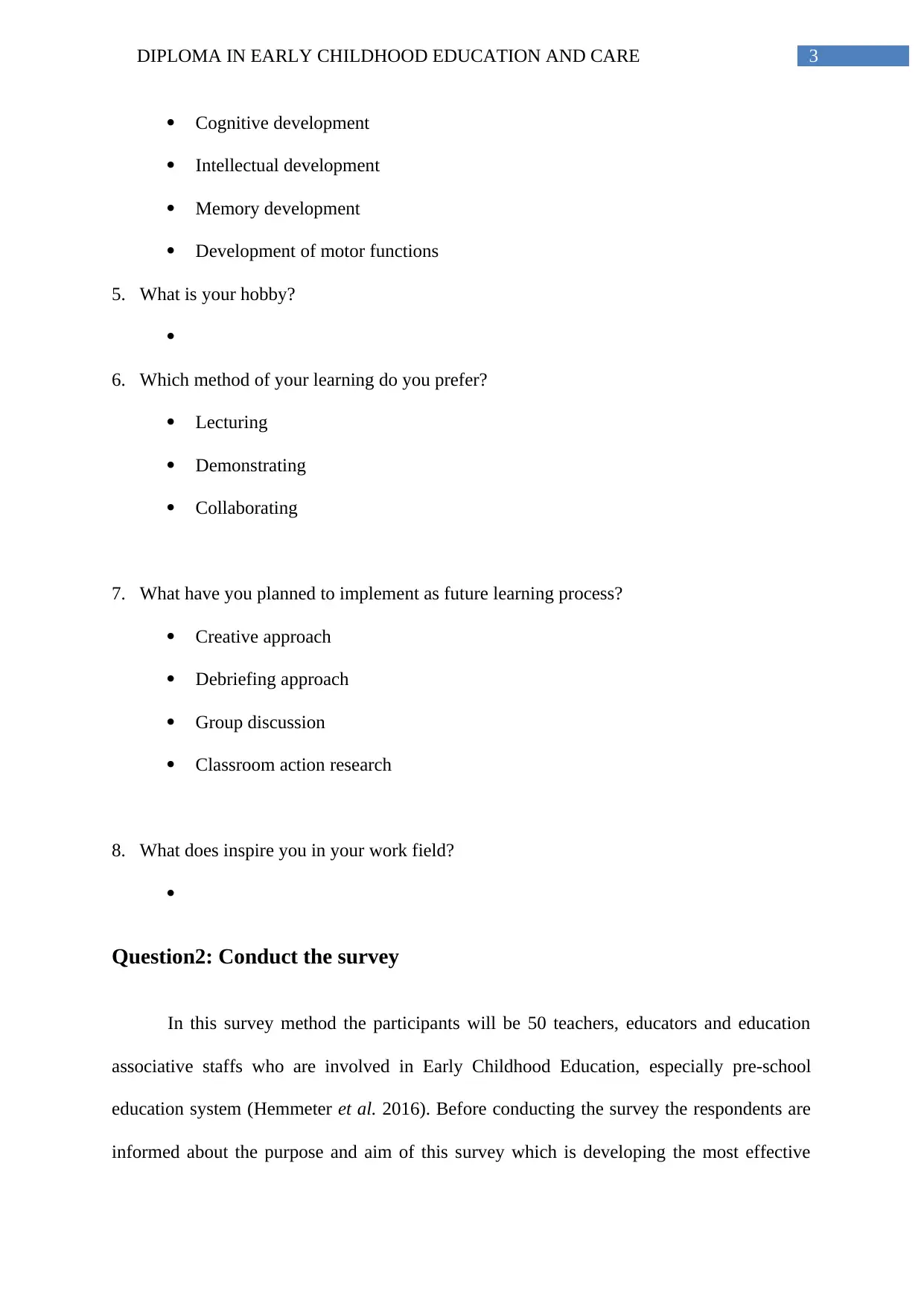
3DIPLOMA IN EARLY CHILDHOOD EDUCATION AND CARE
Cognitive development
Intellectual development
Memory development
Development of motor functions
5. What is your hobby?
6. Which method of your learning do you prefer?
Lecturing
Demonstrating
Collaborating
7. What have you planned to implement as future learning process?
Creative approach
Debriefing approach
Group discussion
Classroom action research
8. What does inspire you in your work field?
Question2: Conduct the survey
In this survey method the participants will be 50 teachers, educators and education
associative staffs who are involved in Early Childhood Education, especially pre-school
education system (Hemmeter et al. 2016). Before conducting the survey the respondents are
informed about the purpose and aim of this survey which is developing the most effective
Cognitive development
Intellectual development
Memory development
Development of motor functions
5. What is your hobby?
6. Which method of your learning do you prefer?
Lecturing
Demonstrating
Collaborating
7. What have you planned to implement as future learning process?
Creative approach
Debriefing approach
Group discussion
Classroom action research
8. What does inspire you in your work field?
Question2: Conduct the survey
In this survey method the participants will be 50 teachers, educators and education
associative staffs who are involved in Early Childhood Education, especially pre-school
education system (Hemmeter et al. 2016). Before conducting the survey the respondents are
informed about the purpose and aim of this survey which is developing the most effective
Paraphrase This Document
Need a fresh take? Get an instant paraphrase of this document with our AI Paraphraser
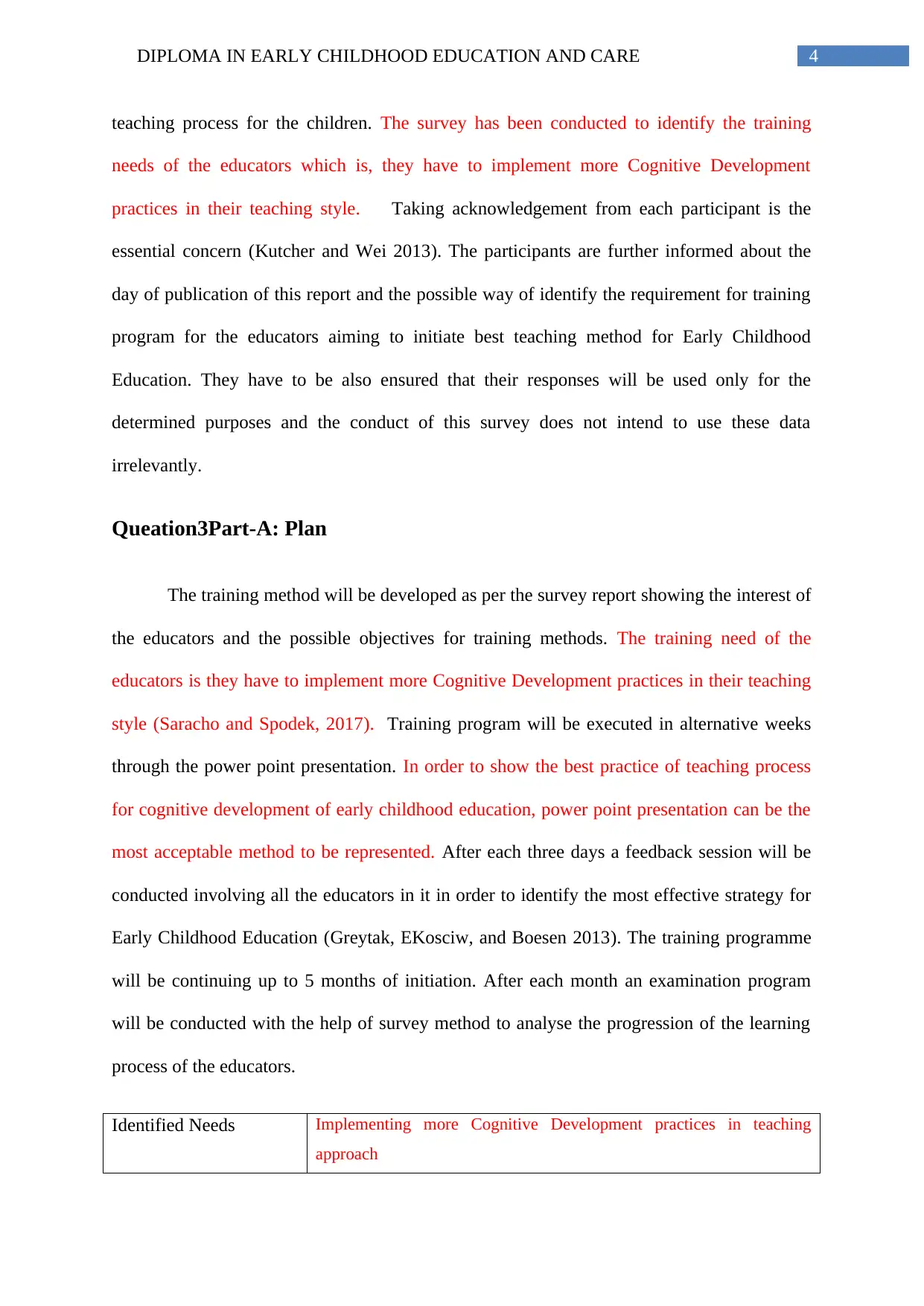
4DIPLOMA IN EARLY CHILDHOOD EDUCATION AND CARE
teaching process for the children. The survey has been conducted to identify the training
needs of the educators which is, they have to implement more Cognitive Development
practices in their teaching style. Taking acknowledgement from each participant is the
essential concern (Kutcher and Wei 2013). The participants are further informed about the
day of publication of this report and the possible way of identify the requirement for training
program for the educators aiming to initiate best teaching method for Early Childhood
Education. They have to be also ensured that their responses will be used only for the
determined purposes and the conduct of this survey does not intend to use these data
irrelevantly.
Queation3Part-A: Plan
The training method will be developed as per the survey report showing the interest of
the educators and the possible objectives for training methods. The training need of the
educators is they have to implement more Cognitive Development practices in their teaching
style (Saracho and Spodek, 2017). Training program will be executed in alternative weeks
through the power point presentation. In order to show the best practice of teaching process
for cognitive development of early childhood education, power point presentation can be the
most acceptable method to be represented. After each three days a feedback session will be
conducted involving all the educators in it in order to identify the most effective strategy for
Early Childhood Education (Greytak, EKosciw, and Boesen 2013). The training programme
will be continuing up to 5 months of initiation. After each month an examination program
will be conducted with the help of survey method to analyse the progression of the learning
process of the educators.
Identified Needs Implementing more Cognitive Development practices in teaching
approach
teaching process for the children. The survey has been conducted to identify the training
needs of the educators which is, they have to implement more Cognitive Development
practices in their teaching style. Taking acknowledgement from each participant is the
essential concern (Kutcher and Wei 2013). The participants are further informed about the
day of publication of this report and the possible way of identify the requirement for training
program for the educators aiming to initiate best teaching method for Early Childhood
Education. They have to be also ensured that their responses will be used only for the
determined purposes and the conduct of this survey does not intend to use these data
irrelevantly.
Queation3Part-A: Plan
The training method will be developed as per the survey report showing the interest of
the educators and the possible objectives for training methods. The training need of the
educators is they have to implement more Cognitive Development practices in their teaching
style (Saracho and Spodek, 2017). Training program will be executed in alternative weeks
through the power point presentation. In order to show the best practice of teaching process
for cognitive development of early childhood education, power point presentation can be the
most acceptable method to be represented. After each three days a feedback session will be
conducted involving all the educators in it in order to identify the most effective strategy for
Early Childhood Education (Greytak, EKosciw, and Boesen 2013). The training programme
will be continuing up to 5 months of initiation. After each month an examination program
will be conducted with the help of survey method to analyse the progression of the learning
process of the educators.
Identified Needs Implementing more Cognitive Development practices in teaching
approach
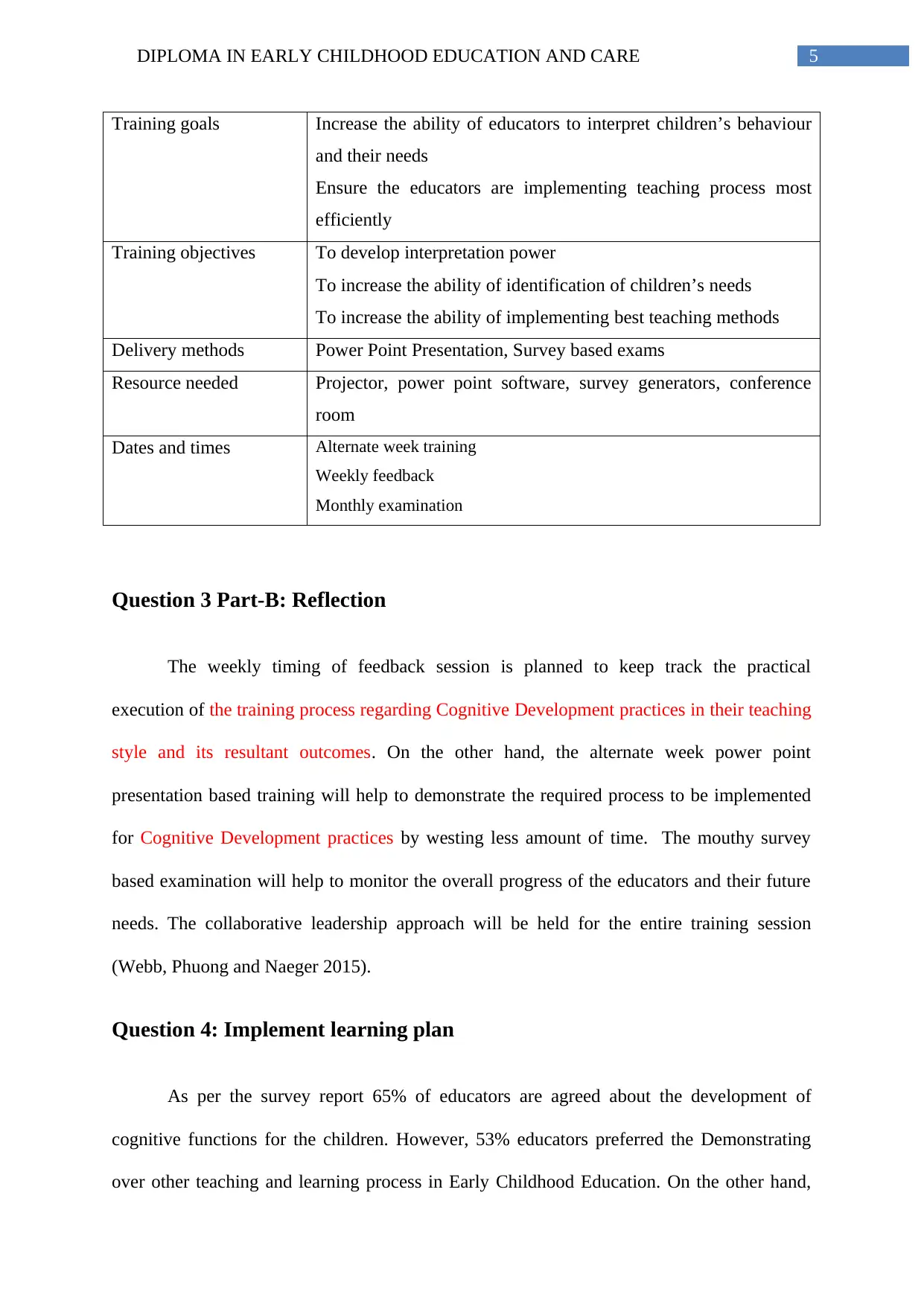
5DIPLOMA IN EARLY CHILDHOOD EDUCATION AND CARE
Training goals Increase the ability of educators to interpret children’s behaviour
and their needs
Ensure the educators are implementing teaching process most
efficiently
Training objectives To develop interpretation power
To increase the ability of identification of children’s needs
To increase the ability of implementing best teaching methods
Delivery methods Power Point Presentation, Survey based exams
Resource needed Projector, power point software, survey generators, conference
room
Dates and times Alternate week training
Weekly feedback
Monthly examination
Question 3 Part-B: Reflection
The weekly timing of feedback session is planned to keep track the practical
execution of the training process regarding Cognitive Development practices in their teaching
style and its resultant outcomes. On the other hand, the alternate week power point
presentation based training will help to demonstrate the required process to be implemented
for Cognitive Development practices by westing less amount of time. The mouthy survey
based examination will help to monitor the overall progress of the educators and their future
needs. The collaborative leadership approach will be held for the entire training session
(Webb, Phuong and Naeger 2015).
Question 4: Implement learning plan
As per the survey report 65% of educators are agreed about the development of
cognitive functions for the children. However, 53% educators preferred the Demonstrating
over other teaching and learning process in Early Childhood Education. On the other hand,
Training goals Increase the ability of educators to interpret children’s behaviour
and their needs
Ensure the educators are implementing teaching process most
efficiently
Training objectives To develop interpretation power
To increase the ability of identification of children’s needs
To increase the ability of implementing best teaching methods
Delivery methods Power Point Presentation, Survey based exams
Resource needed Projector, power point software, survey generators, conference
room
Dates and times Alternate week training
Weekly feedback
Monthly examination
Question 3 Part-B: Reflection
The weekly timing of feedback session is planned to keep track the practical
execution of the training process regarding Cognitive Development practices in their teaching
style and its resultant outcomes. On the other hand, the alternate week power point
presentation based training will help to demonstrate the required process to be implemented
for Cognitive Development practices by westing less amount of time. The mouthy survey
based examination will help to monitor the overall progress of the educators and their future
needs. The collaborative leadership approach will be held for the entire training session
(Webb, Phuong and Naeger 2015).
Question 4: Implement learning plan
As per the survey report 65% of educators are agreed about the development of
cognitive functions for the children. However, 53% educators preferred the Demonstrating
over other teaching and learning process in Early Childhood Education. On the other hand,
⊘ This is a preview!⊘
Do you want full access?
Subscribe today to unlock all pages.

Trusted by 1+ million students worldwide
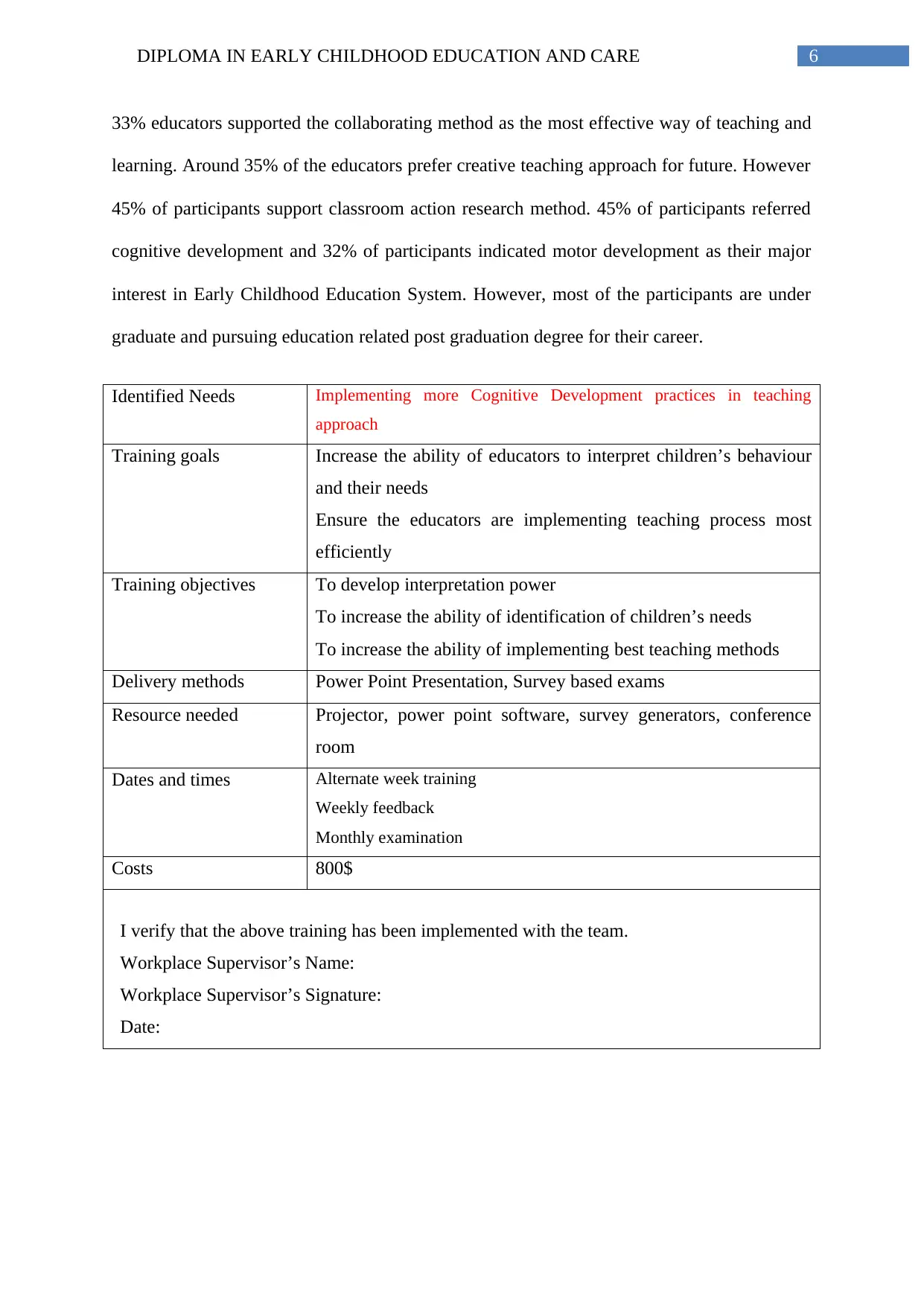
6DIPLOMA IN EARLY CHILDHOOD EDUCATION AND CARE
33% educators supported the collaborating method as the most effective way of teaching and
learning. Around 35% of the educators prefer creative teaching approach for future. However
45% of participants support classroom action research method. 45% of participants referred
cognitive development and 32% of participants indicated motor development as their major
interest in Early Childhood Education System. However, most of the participants are under
graduate and pursuing education related post graduation degree for their career.
Identified Needs Implementing more Cognitive Development practices in teaching
approach
Training goals Increase the ability of educators to interpret children’s behaviour
and their needs
Ensure the educators are implementing teaching process most
efficiently
Training objectives To develop interpretation power
To increase the ability of identification of children’s needs
To increase the ability of implementing best teaching methods
Delivery methods Power Point Presentation, Survey based exams
Resource needed Projector, power point software, survey generators, conference
room
Dates and times Alternate week training
Weekly feedback
Monthly examination
Costs 800$
I verify that the above training has been implemented with the team.
Workplace Supervisor’s Name:
Workplace Supervisor’s Signature:
Date:
33% educators supported the collaborating method as the most effective way of teaching and
learning. Around 35% of the educators prefer creative teaching approach for future. However
45% of participants support classroom action research method. 45% of participants referred
cognitive development and 32% of participants indicated motor development as their major
interest in Early Childhood Education System. However, most of the participants are under
graduate and pursuing education related post graduation degree for their career.
Identified Needs Implementing more Cognitive Development practices in teaching
approach
Training goals Increase the ability of educators to interpret children’s behaviour
and their needs
Ensure the educators are implementing teaching process most
efficiently
Training objectives To develop interpretation power
To increase the ability of identification of children’s needs
To increase the ability of implementing best teaching methods
Delivery methods Power Point Presentation, Survey based exams
Resource needed Projector, power point software, survey generators, conference
room
Dates and times Alternate week training
Weekly feedback
Monthly examination
Costs 800$
I verify that the above training has been implemented with the team.
Workplace Supervisor’s Name:
Workplace Supervisor’s Signature:
Date:
Paraphrase This Document
Need a fresh take? Get an instant paraphrase of this document with our AI Paraphraser
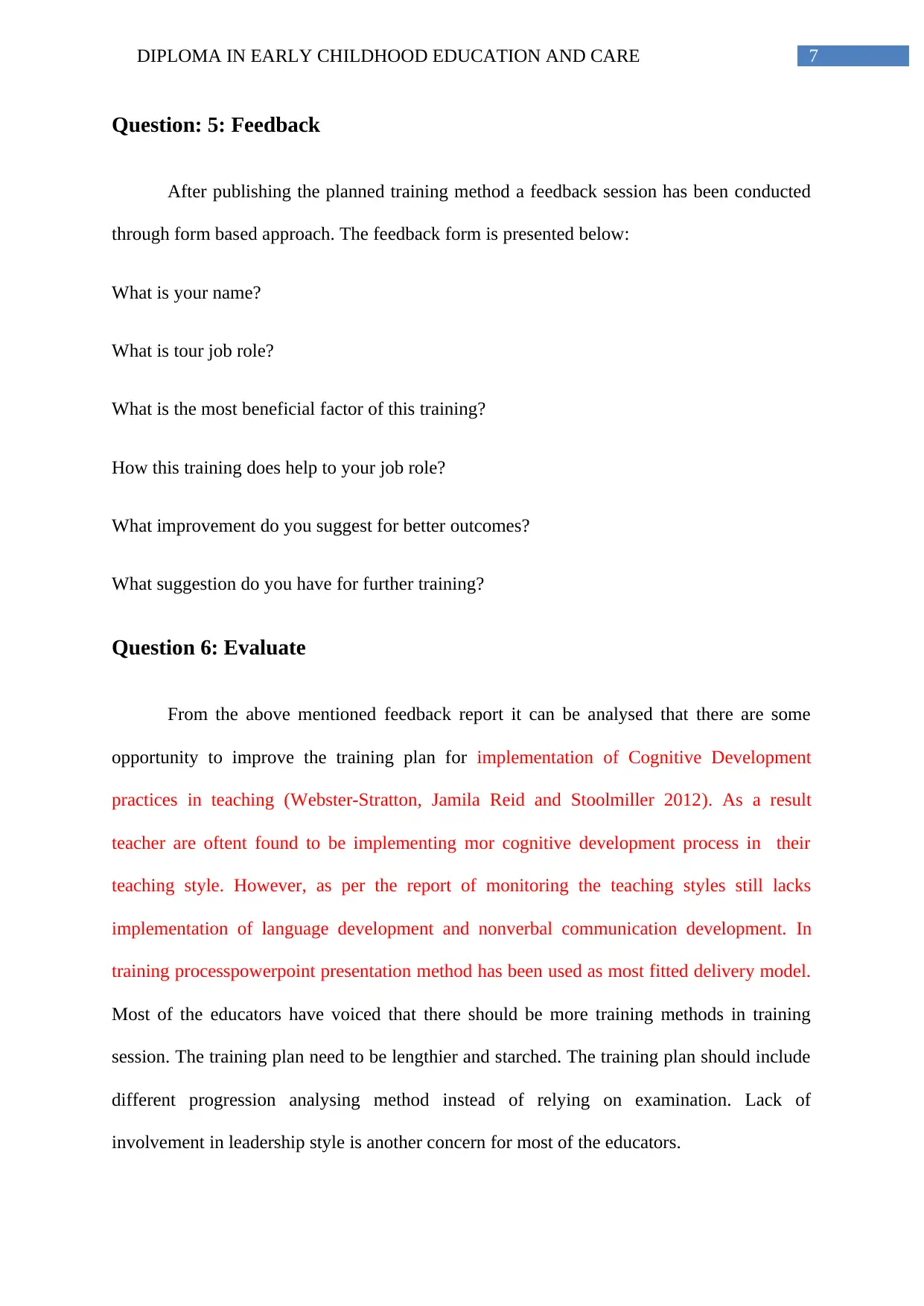
7DIPLOMA IN EARLY CHILDHOOD EDUCATION AND CARE
Question: 5: Feedback
After publishing the planned training method a feedback session has been conducted
through form based approach. The feedback form is presented below:
What is your name?
What is tour job role?
What is the most beneficial factor of this training?
How this training does help to your job role?
What improvement do you suggest for better outcomes?
What suggestion do you have for further training?
Question 6: Evaluate
From the above mentioned feedback report it can be analysed that there are some
opportunity to improve the training plan for implementation of Cognitive Development
practices in teaching (Webster‐Stratton, Jamila Reid and Stoolmiller 2012). As a result
teacher are oftent found to be implementing mor cognitive development process in their
teaching style. However, as per the report of monitoring the teaching styles still lacks
implementation of language development and nonverbal communication development. In
training processpowerpoint presentation method has been used as most fitted delivery model.
Most of the educators have voiced that there should be more training methods in training
session. The training plan need to be lengthier and starched. The training plan should include
different progression analysing method instead of relying on examination. Lack of
involvement in leadership style is another concern for most of the educators.
Question: 5: Feedback
After publishing the planned training method a feedback session has been conducted
through form based approach. The feedback form is presented below:
What is your name?
What is tour job role?
What is the most beneficial factor of this training?
How this training does help to your job role?
What improvement do you suggest for better outcomes?
What suggestion do you have for further training?
Question 6: Evaluate
From the above mentioned feedback report it can be analysed that there are some
opportunity to improve the training plan for implementation of Cognitive Development
practices in teaching (Webster‐Stratton, Jamila Reid and Stoolmiller 2012). As a result
teacher are oftent found to be implementing mor cognitive development process in their
teaching style. However, as per the report of monitoring the teaching styles still lacks
implementation of language development and nonverbal communication development. In
training processpowerpoint presentation method has been used as most fitted delivery model.
Most of the educators have voiced that there should be more training methods in training
session. The training plan need to be lengthier and starched. The training plan should include
different progression analysing method instead of relying on examination. Lack of
involvement in leadership style is another concern for most of the educators.
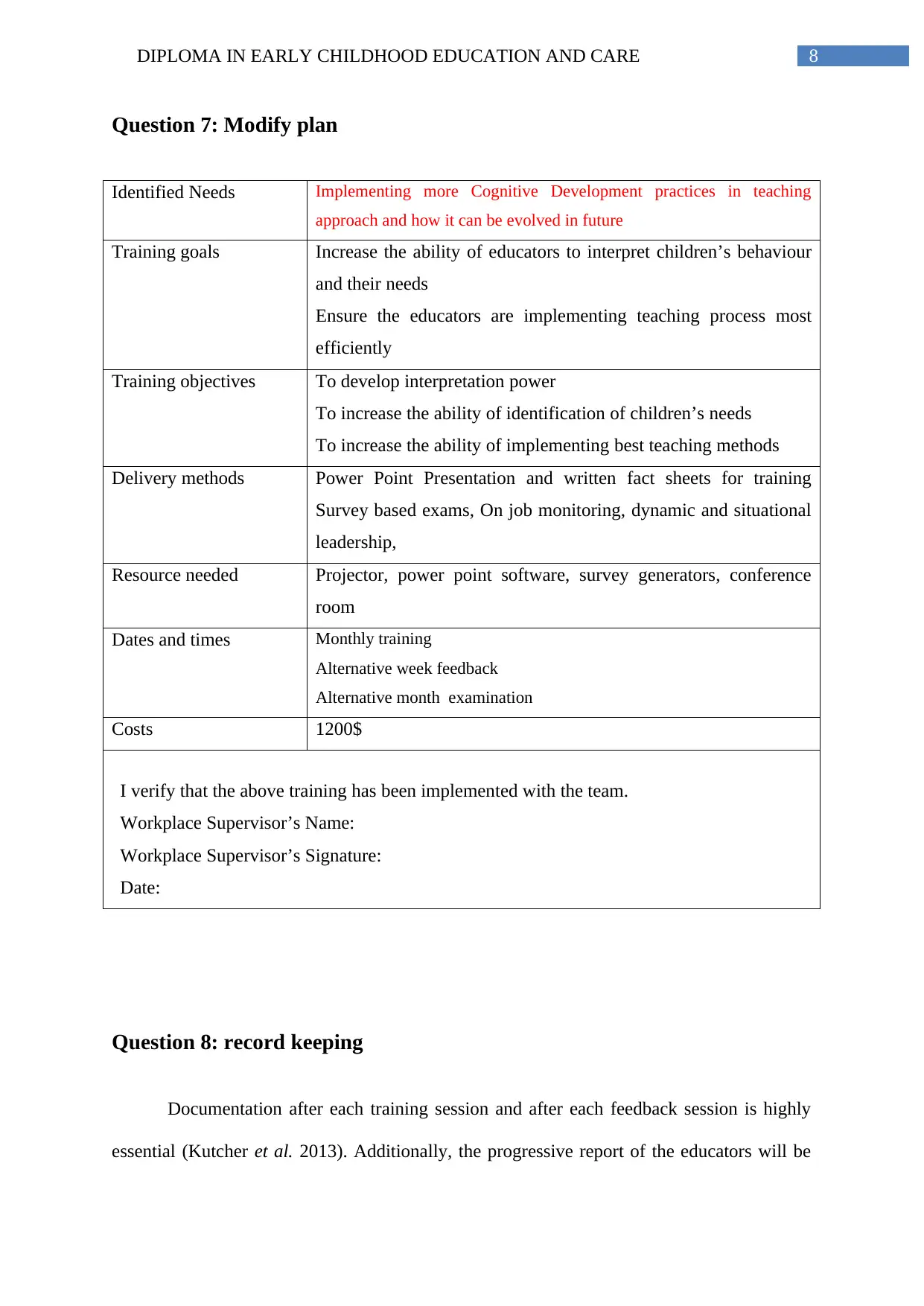
8DIPLOMA IN EARLY CHILDHOOD EDUCATION AND CARE
Question 7: Modify plan
Identified Needs Implementing more Cognitive Development practices in teaching
approach and how it can be evolved in future
Training goals Increase the ability of educators to interpret children’s behaviour
and their needs
Ensure the educators are implementing teaching process most
efficiently
Training objectives To develop interpretation power
To increase the ability of identification of children’s needs
To increase the ability of implementing best teaching methods
Delivery methods Power Point Presentation and written fact sheets for training
Survey based exams, On job monitoring, dynamic and situational
leadership,
Resource needed Projector, power point software, survey generators, conference
room
Dates and times Monthly training
Alternative week feedback
Alternative month examination
Costs 1200$
I verify that the above training has been implemented with the team.
Workplace Supervisor’s Name:
Workplace Supervisor’s Signature:
Date:
Question 8: record keeping
Documentation after each training session and after each feedback session is highly
essential (Kutcher et al. 2013). Additionally, the progressive report of the educators will be
Question 7: Modify plan
Identified Needs Implementing more Cognitive Development practices in teaching
approach and how it can be evolved in future
Training goals Increase the ability of educators to interpret children’s behaviour
and their needs
Ensure the educators are implementing teaching process most
efficiently
Training objectives To develop interpretation power
To increase the ability of identification of children’s needs
To increase the ability of implementing best teaching methods
Delivery methods Power Point Presentation and written fact sheets for training
Survey based exams, On job monitoring, dynamic and situational
leadership,
Resource needed Projector, power point software, survey generators, conference
room
Dates and times Monthly training
Alternative week feedback
Alternative month examination
Costs 1200$
I verify that the above training has been implemented with the team.
Workplace Supervisor’s Name:
Workplace Supervisor’s Signature:
Date:
Question 8: record keeping
Documentation after each training session and after each feedback session is highly
essential (Kutcher et al. 2013). Additionally, the progressive report of the educators will be
⊘ This is a preview!⊘
Do you want full access?
Subscribe today to unlock all pages.

Trusted by 1+ million students worldwide
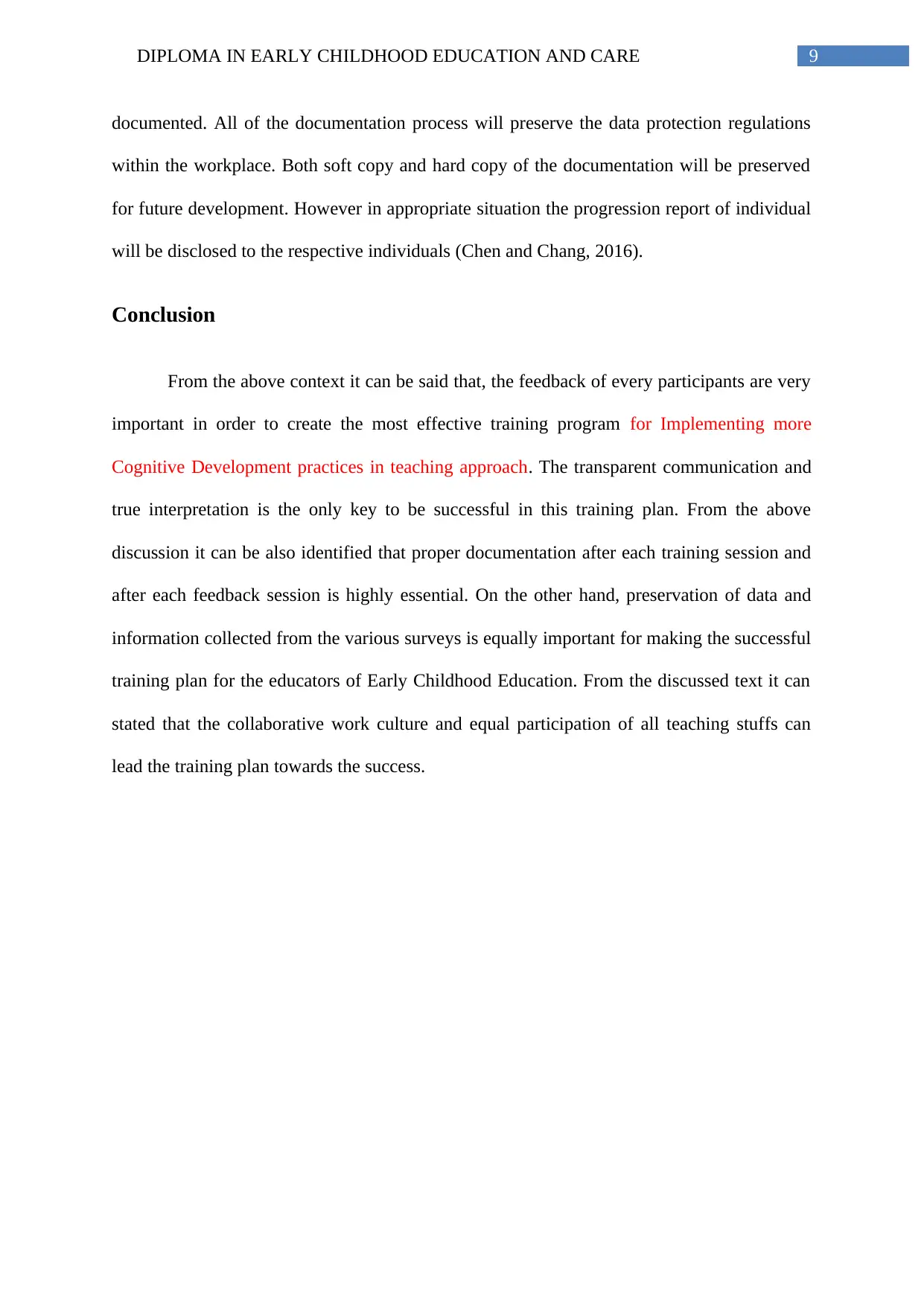
9DIPLOMA IN EARLY CHILDHOOD EDUCATION AND CARE
documented. All of the documentation process will preserve the data protection regulations
within the workplace. Both soft copy and hard copy of the documentation will be preserved
for future development. However in appropriate situation the progression report of individual
will be disclosed to the respective individuals (Chen and Chang, 2016).
Conclusion
From the above context it can be said that, the feedback of every participants are very
important in order to create the most effective training program for Implementing more
Cognitive Development practices in teaching approach. The transparent communication and
true interpretation is the only key to be successful in this training plan. From the above
discussion it can be also identified that proper documentation after each training session and
after each feedback session is highly essential. On the other hand, preservation of data and
information collected from the various surveys is equally important for making the successful
training plan for the educators of Early Childhood Education. From the discussed text it can
stated that the collaborative work culture and equal participation of all teaching stuffs can
lead the training plan towards the success.
documented. All of the documentation process will preserve the data protection regulations
within the workplace. Both soft copy and hard copy of the documentation will be preserved
for future development. However in appropriate situation the progression report of individual
will be disclosed to the respective individuals (Chen and Chang, 2016).
Conclusion
From the above context it can be said that, the feedback of every participants are very
important in order to create the most effective training program for Implementing more
Cognitive Development practices in teaching approach. The transparent communication and
true interpretation is the only key to be successful in this training plan. From the above
discussion it can be also identified that proper documentation after each training session and
after each feedback session is highly essential. On the other hand, preservation of data and
information collected from the various surveys is equally important for making the successful
training plan for the educators of Early Childhood Education. From the discussed text it can
stated that the collaborative work culture and equal participation of all teaching stuffs can
lead the training plan towards the success.
Paraphrase This Document
Need a fresh take? Get an instant paraphrase of this document with our AI Paraphraser
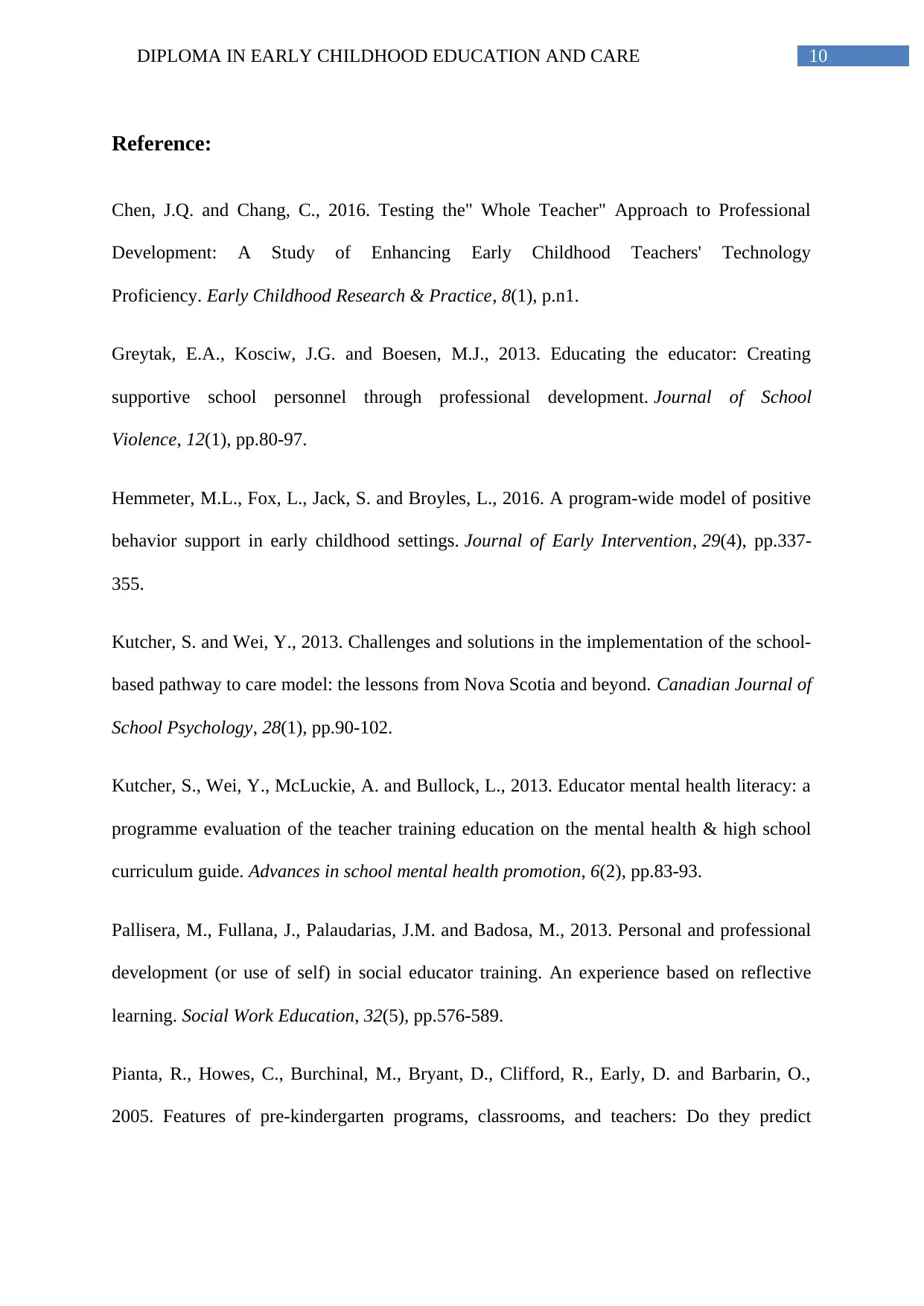
10DIPLOMA IN EARLY CHILDHOOD EDUCATION AND CARE
Reference:
Chen, J.Q. and Chang, C., 2016. Testing the" Whole Teacher" Approach to Professional
Development: A Study of Enhancing Early Childhood Teachers' Technology
Proficiency. Early Childhood Research & Practice, 8(1), p.n1.
Greytak, E.A., Kosciw, J.G. and Boesen, M.J., 2013. Educating the educator: Creating
supportive school personnel through professional development. Journal of School
Violence, 12(1), pp.80-97.
Hemmeter, M.L., Fox, L., Jack, S. and Broyles, L., 2016. A program-wide model of positive
behavior support in early childhood settings. Journal of Early Intervention, 29(4), pp.337-
355.
Kutcher, S. and Wei, Y., 2013. Challenges and solutions in the implementation of the school-
based pathway to care model: the lessons from Nova Scotia and beyond. Canadian Journal of
School Psychology, 28(1), pp.90-102.
Kutcher, S., Wei, Y., McLuckie, A. and Bullock, L., 2013. Educator mental health literacy: a
programme evaluation of the teacher training education on the mental health & high school
curriculum guide. Advances in school mental health promotion, 6(2), pp.83-93.
Pallisera, M., Fullana, J., Palaudarias, J.M. and Badosa, M., 2013. Personal and professional
development (or use of self) in social educator training. An experience based on reflective
learning. Social Work Education, 32(5), pp.576-589.
Pianta, R., Howes, C., Burchinal, M., Bryant, D., Clifford, R., Early, D. and Barbarin, O.,
2005. Features of pre-kindergarten programs, classrooms, and teachers: Do they predict
Reference:
Chen, J.Q. and Chang, C., 2016. Testing the" Whole Teacher" Approach to Professional
Development: A Study of Enhancing Early Childhood Teachers' Technology
Proficiency. Early Childhood Research & Practice, 8(1), p.n1.
Greytak, E.A., Kosciw, J.G. and Boesen, M.J., 2013. Educating the educator: Creating
supportive school personnel through professional development. Journal of School
Violence, 12(1), pp.80-97.
Hemmeter, M.L., Fox, L., Jack, S. and Broyles, L., 2016. A program-wide model of positive
behavior support in early childhood settings. Journal of Early Intervention, 29(4), pp.337-
355.
Kutcher, S. and Wei, Y., 2013. Challenges and solutions in the implementation of the school-
based pathway to care model: the lessons from Nova Scotia and beyond. Canadian Journal of
School Psychology, 28(1), pp.90-102.
Kutcher, S., Wei, Y., McLuckie, A. and Bullock, L., 2013. Educator mental health literacy: a
programme evaluation of the teacher training education on the mental health & high school
curriculum guide. Advances in school mental health promotion, 6(2), pp.83-93.
Pallisera, M., Fullana, J., Palaudarias, J.M. and Badosa, M., 2013. Personal and professional
development (or use of self) in social educator training. An experience based on reflective
learning. Social Work Education, 32(5), pp.576-589.
Pianta, R., Howes, C., Burchinal, M., Bryant, D., Clifford, R., Early, D. and Barbarin, O.,
2005. Features of pre-kindergarten programs, classrooms, and teachers: Do they predict
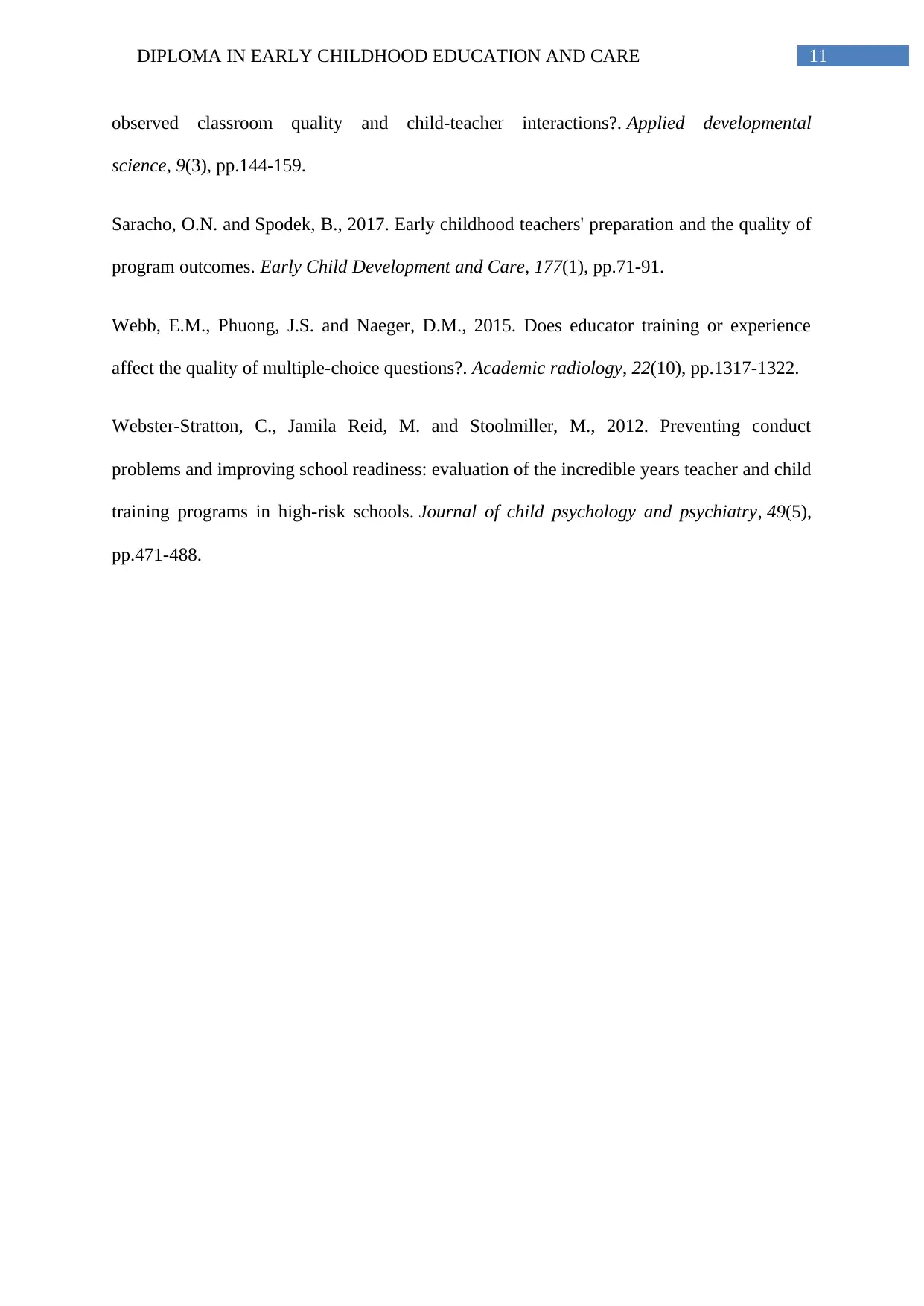
11DIPLOMA IN EARLY CHILDHOOD EDUCATION AND CARE
observed classroom quality and child-teacher interactions?. Applied developmental
science, 9(3), pp.144-159.
Saracho, O.N. and Spodek, B., 2017. Early childhood teachers' preparation and the quality of
program outcomes. Early Child Development and Care, 177(1), pp.71-91.
Webb, E.M., Phuong, J.S. and Naeger, D.M., 2015. Does educator training or experience
affect the quality of multiple-choice questions?. Academic radiology, 22(10), pp.1317-1322.
Webster‐Stratton, C., Jamila Reid, M. and Stoolmiller, M., 2012. Preventing conduct
problems and improving school readiness: evaluation of the incredible years teacher and child
training programs in high‐risk schools. Journal of child psychology and psychiatry, 49(5),
pp.471-488.
observed classroom quality and child-teacher interactions?. Applied developmental
science, 9(3), pp.144-159.
Saracho, O.N. and Spodek, B., 2017. Early childhood teachers' preparation and the quality of
program outcomes. Early Child Development and Care, 177(1), pp.71-91.
Webb, E.M., Phuong, J.S. and Naeger, D.M., 2015. Does educator training or experience
affect the quality of multiple-choice questions?. Academic radiology, 22(10), pp.1317-1322.
Webster‐Stratton, C., Jamila Reid, M. and Stoolmiller, M., 2012. Preventing conduct
problems and improving school readiness: evaluation of the incredible years teacher and child
training programs in high‐risk schools. Journal of child psychology and psychiatry, 49(5),
pp.471-488.
⊘ This is a preview!⊘
Do you want full access?
Subscribe today to unlock all pages.

Trusted by 1+ million students worldwide
1 out of 12
Related Documents
Your All-in-One AI-Powered Toolkit for Academic Success.
+13062052269
info@desklib.com
Available 24*7 on WhatsApp / Email
![[object Object]](/_next/static/media/star-bottom.7253800d.svg)
Unlock your academic potential
Copyright © 2020–2026 A2Z Services. All Rights Reserved. Developed and managed by ZUCOL.





